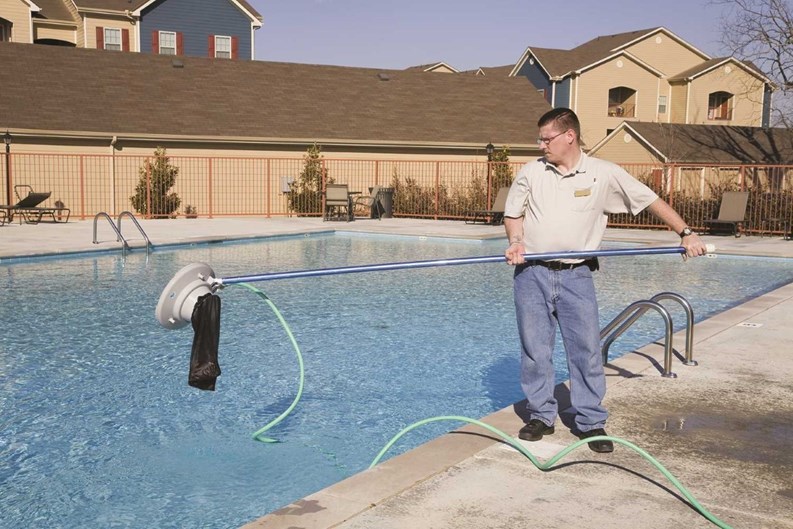Olivia Pope, the main character on ABC’s Scandal, is a professional fixer. If you have a problem—any problem—she can fix it. Over the past two seasons plus, she’s rigged elections, covered up murders, employed professional hit men, exposed secrets, made and ruined countless lives, and played hard to get with the President of the United States. But the most amazing thing about Olivia Pope is that she’s always available. Walk into her office, she’s there. Call her cell, she’ll pick up. And when she answers, she can make even the biggest problems disappear.
In another life, Olivia Pope would be a terrific property manager—the best property manager who ever existed. After all, if she can rig presidential elections, she can handle complaints about noise and leaky pipes. But Olivia Pope is fictional in more ways than one. No one answers the phone every time it rings.
Whenever a problem arises in a condo or homeowners association—whether it’s a leak, a noisy neighbor, or some procedural question that has come up—it’s the impulse of many board members and residents to pick up the phone and immediately call their property manager. Most times, this is the right thing to do: the manager is first in line in an HOA’s administrative hierarchy. That said, there’s a right way and a wrong way to call your manager—and sometimes, it’s not appropriate to call at all. Enough calls at the worst possible time, or for the most trivial matters will only make you a total pest, and could even make your manager less enthused about helping you with future problems.
When to Call
In my years interviewing property managers and other professionals for The Cooperator, I have determined that the best time to call a source is at 9:30 in the morning on Tuesday—not quite the beginning of the week, not quite the beginning of the day. Nine times out of ten, this has worked for me. It was ironic, then, that when I called the sources for this piece at that time, no one could come to the phone.
“First thing in the morning is bad,” says Michael Rutkowski, president of First Community Management in Chicago. At that time, Rutkowski says he is busy catching up on e-mails, handling urgent matters, and otherwise determining the day’s plan of attack.
Keith Hales, the president of Chicago-based Hales Property Management, disagrees. “I would say that early morning is the best time to reach your manager,” he says, suggesting that my 9:30 a.m. theory is prudent. So which is it?
“There’s really not a best time to call,” explains Scott Seger, president of Chicago-based Forth Group Management. This is because no two days are exactly alike. He may be in the office early on Monday, but spend all day Tuesday on site. “A lot of times we’re out on the road, taking care of a problem.”
Just as there are worst times to call your property manager, there are worst times. “Evenings, weekends or Friday afternoons are usually the worst,” Hales says, “as we are typically trying to solve weekend issues and/or requiring some down time.” (Contrary to popular belief, property managers, unlike Olivia Pope, do need to rest from time to time).
This changes if the situation is an actual emergency, or otherwise urgent. In those cases, property managers will make themselves available no matter what.
“If a board member has an emergency, or an urgent request, call and we’ll call right back,” Seger says. “If it’s just a random question, it’s better to send it by email.”
With the advent of smartphones, property managers can check their email constantly throughout the day, even when out of the office. So even emergencies may be handled with great speed when emailed, strange as it sounds. “Email for me is always best,” says Hales, “or through our online web portal system.”
Why to Call, and How
Another point about Olivia Pope: every situation she deals with is a legitimate, dire emergency. If she doesn’t produce the documents in 24 hours, the story breaks and all hell breaks loose.
This is not the case with residential properties—although sometimes board members and residents can think that it is. The reality is, not every problem is a matter of life and death. If the heat stops working and it’s 13 degrees and it’s the middle of the night, that needs to be addressed right away; same thing with a gas leak. Almost anything else can be handled as soon as administratively possible. Indeed, much of a property manager’s job is prioritizing, rather than leaping into action every time the phone rings.
“The one main thing to keep in mind is that managers are busy,” says Seger. “Typically, they want to respond immediately.” But they are not always able to do that. If a resident of Building A calls about a noise complaint, the manager will first handle the gas leak in Building B.
“In today’s society, everyone is used to instant response,” he says. While managers would like to be able to do that, it’s not possible given their workload. “We’re not like doctors or lawyers where everyone makes a lot of money. Managers work hard—there’s a lot to take care of.”
And most managers have multiple buildings they handle. “When managing a portfolio of smaller buildings, associations share managers to help reduce management cost,” Hales explains. “However, response times can be slightly delayed.”
There are those impatient residents and board members who, if they don’t get a response to an email in an hour, will send the email again. If three hours go by, they begin calling and demanding to speak to a manager—or the manager’s boss. Sometimes, an immediate response is not possible, or necessary.
“Expect a return call within one business day,” says Rutkowski. “By the nature of the job, the manager is out in the field. That’s why you may have to wait a day.”
But that return call can come with news. If you leave a message about an issue at the building, it doesn’t help much for a manager to stop what he’s doing and call back just to say he got the message. Better to first handle the problem and then report back the result. “Your problem will generally be remedied in one day,” Rutkowski says.
Sometimes, residents and board members will take it to the extreme.
“There are times when a manager will use a home phone or a personal cell phone to return a call,” Rutkowski says. This can happen when a situation is resolved after normal business hours. “Homeowners have kept that number. I’ve had people call my home at 2 a.m. because they were drunk and locked out of their condo.” Needless to say, this sort of thing is not the prudent course of action.
One way that both boards and HOAs and managers can be proactive is to alert homeowners of projects in the building. If there’s banging and clattering at seven in the morning on a Wednesday, residents might call in droves to ask after it, or to complain. If the manager sends around a notice explaining that maintenance workers are coming early Wednesday to repair the heating pipes that will eliminate all those extra calls.
“One of the main things is using the company’s communication tools to let people know what’s going on,” Seger says. “Answer questions before people can ask them.”
In a similar vein, most HOAs have master plans, spelling out when certain projects are to be done—what’s happening in the fall, in the spring, two years from now, and so forth. This, too, should be readily available to homeowners, Seger advises.
Property managers may not be as perfect as Olivia Pope, but by prioritizing, communicating, and collaborating with the boards of their various properties, they don't have to be.
Greg Olear is a freelance writer and a frequent contributor to The Chicagoland Cooperator.







Comments
Leave a Comment